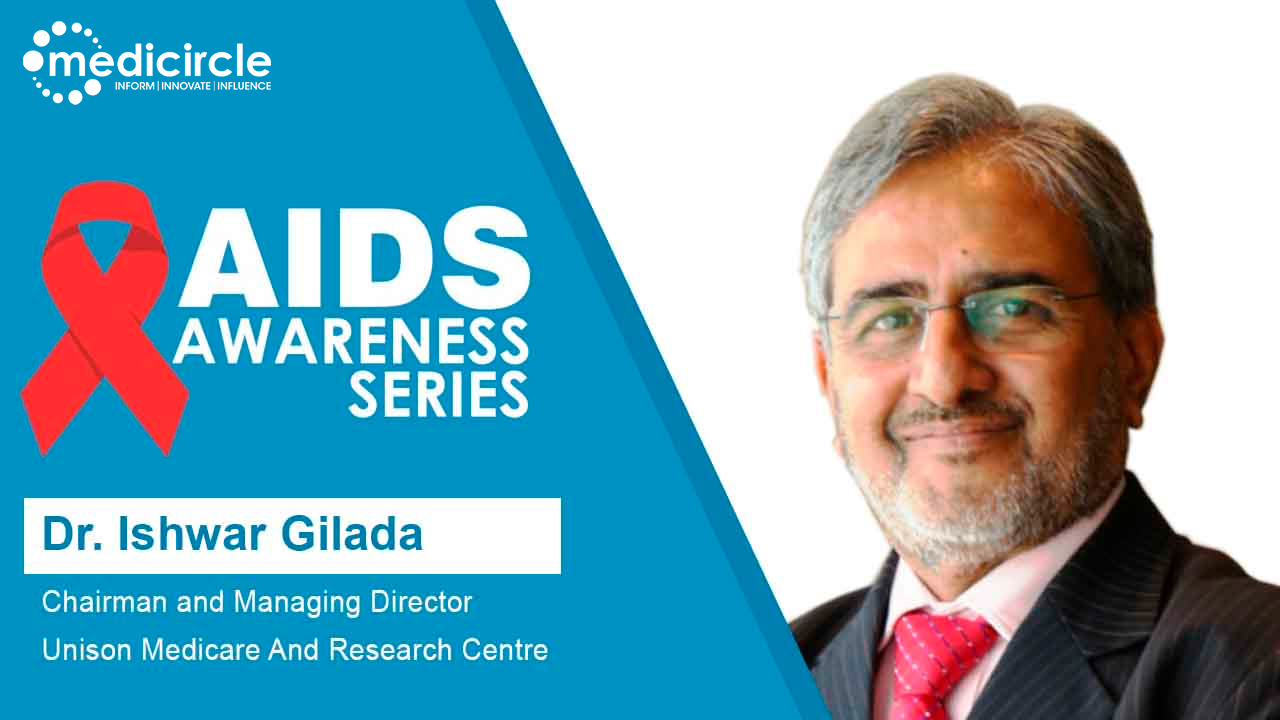Dr. Ishwar Gilada is a globally acclaimed HIV expert, credited with bringing India on the AIDS control map of the world. He is the President of AIDS Society of India (ASI), Secretary-General of Peoples Health Organisation-India (PHO) the premier NGO. Among the innumerable awards and recognitions, he has received, a remarkable one is "The Outstanding Young Person of the World" award conferred on him by The Junior Chamber International, USA. Being a very ardent teacher, he has trained thousands of students, doctors, nurses, social workers, and counselors in HIV care.
HIV AIDS – Then and Now
Dr. Ishwar says, “Earlier there was no treatment for HIV AIDS. But now things have changed. Now it is bilateral traffic. Now we can revert AIDS patients into HIV-positive people. Apart from this, we can also reduce the viral load of an HIV-positive person with medicines. AIDS is a group of diseases and advanced stages of HIV infection. HIV is a virus that gradually weakens the body’s immunity. We all have double immunity. Recent guidelines of AIDS treatment focus on ‘Test and Treat’. As soon as the person tests positive, treatment is immediately started. We should try to limit HIV positive to positive and prevent it from developing into AIDS. In the same way, we should try converting AIDS patients into the HIV-positive stage.
1. The patient can live a normal lifespan, regardless of when (at what age) he/she was diagnosed.
2. We can prevent further complications of HIV by taking regular medicines.
3. With medications, we can reduce the viral load to such an extent that it goes undetectable.
4. If a HIV-positive person overcomes all his mental pressure and stress, then the person can easily live a happy and healthy life."
HIV infection treatment
Dr. Ishwar listed out different steps used to treat HIV infection
Counseling – Avoid bad habits (smoking, drinking, tobacco)
Supportive care – Yoga, exercise
Symptomatic treatment – treatment for symptoms
Treatment of opportunistic infections
Treatment of HIV – Viral load can be suppressed to a great extent. Medications are very effective in defeating the virus of CD4 cells. Medicines are available that can cross BBB and destroy the affected CD4 cells in the nervous system. By taking 3-6 months of regular HIV medicines, the patient's viral load comes to an undetectable phase. Patients with undetected viral load cannot transmit infection. And undetected is untransmittable.
Is there a cure for AIDS?
Dr. Ishwar expresses, "There is no cure for AIDS. But we can very well control HIV infection by giving tablets and injections. Because of COVID, there was a slight delay in treatment research. Scientists are trying their best to make vaccines for AIDS. Vaccines are of two types –
Preventive vaccine – Prevent the disease
Therapeutic vaccine – Treat the disease
As of now, we don’t have AIDS vaccine. Despite the non-availability of vaccines, you can still lead a normal life being HIV positive by taking medicines on time. So, don’t be scared. Live your life to the fullest."
Other associated health risks with HIV
Dr. Ishwar mentions, “Often HIV positive people fall in the grip of negative thoughts. These negative thoughts are because of the stigma and discrimination associated with it. Depression, suicidal tendencies are very common in these people. Acceptance is a big thing. We need to accept reality. We can't run away from the truth. The mental health of an HIV-positive patient is very important as HIV Stigma can negatively affect the health and well-being of people living with HIV. Society shouldn’t discriminate against positive patients, instead, they should secure their rights. Be nice to these patients, treat them well, help them to get the treatment done."
"HIV stigma causes discrimination in all sectors of society, including health care, education, the workplace, families, and communities. Moreover, families, friends, and colleagues should break down the HIV stigma. They should encourage, motivate them to live happily and healthy. The HIV/AIDS Prevention Act 2017, aims to prevent and control the spread of HIV AIDS and provides penalties for discrimination against the HIV-positive person."
(Edited by Renu Gupta)

 Dr. Ishwar Gilada provides valuable insights on the treatment of HIV infection. He also emphasizes ending the stigma and discrimination attached to HIV AIDS. We all can play an important role by offering support and speaking out to correct myths.
Dr. Ishwar Gilada provides valuable insights on the treatment of HIV infection. He also emphasizes ending the stigma and discrimination attached to HIV AIDS. We all can play an important role by offering support and speaking out to correct myths.





.jpeg)

.jpeg)
.jpeg)
.jpeg)
.jpeg)
.jpeg)
.jpeg)
.jpeg)






.jpeg)



.jpeg)
.jpeg)







.jpg)

